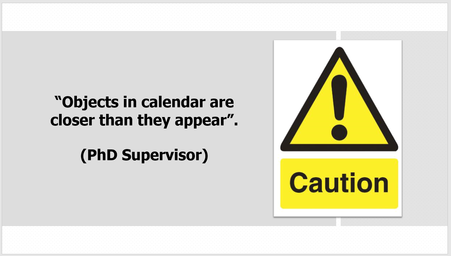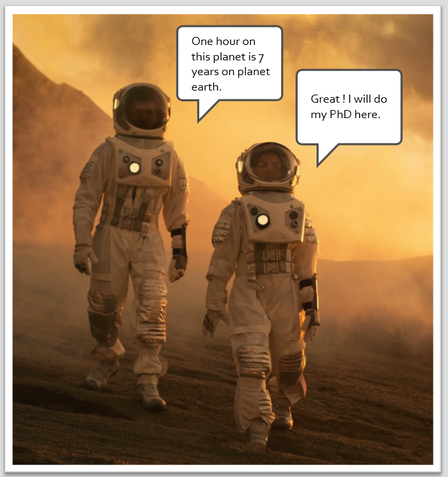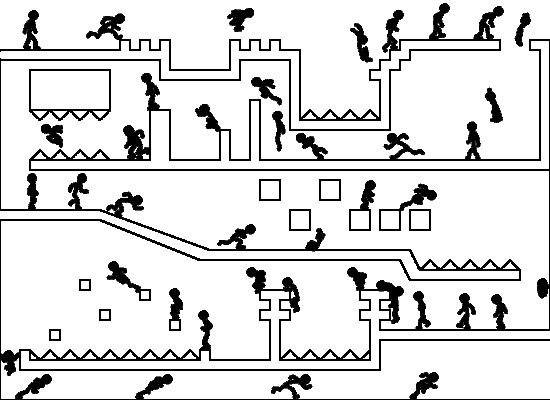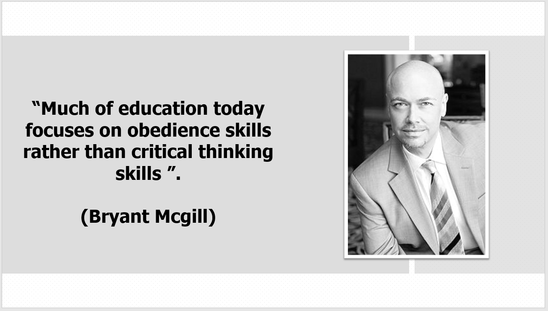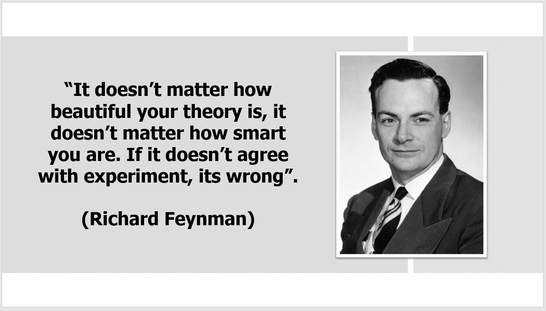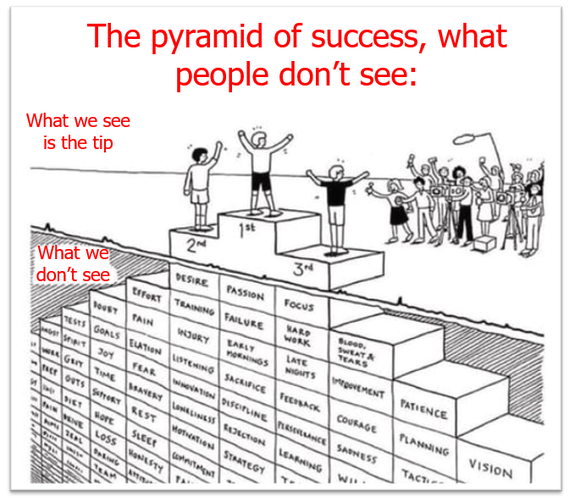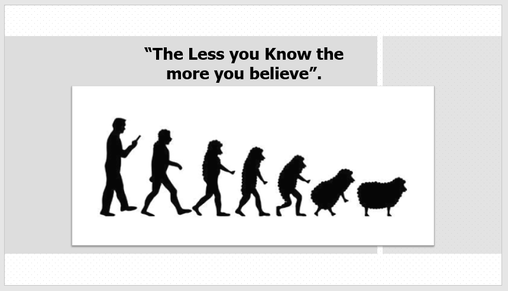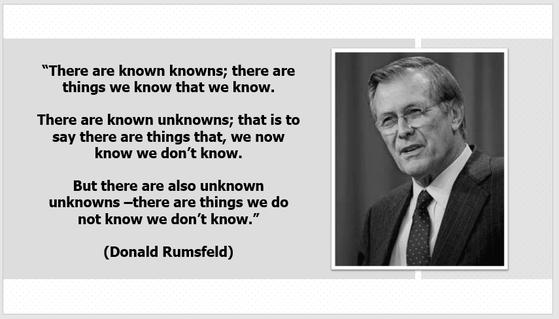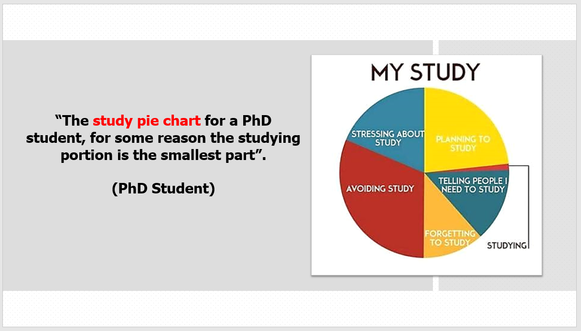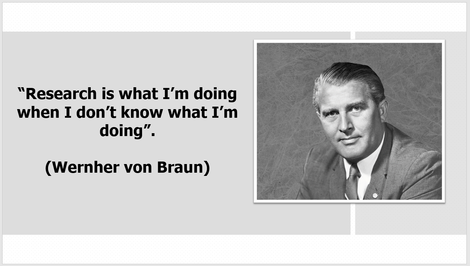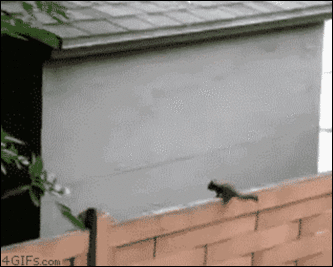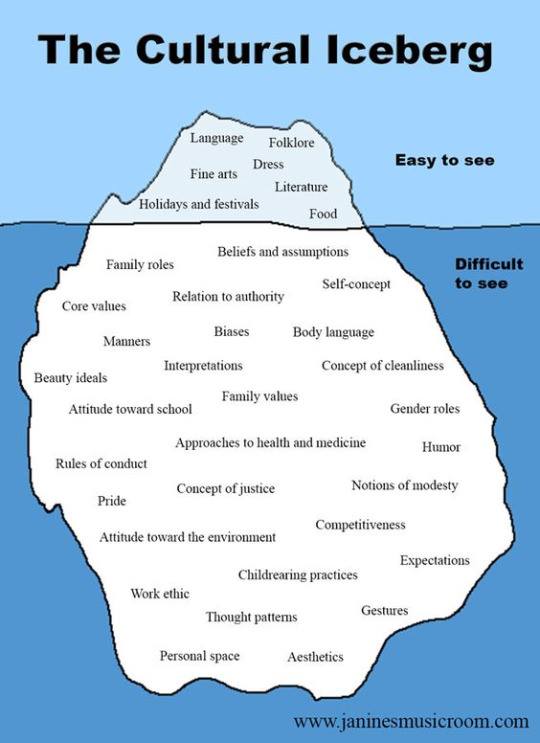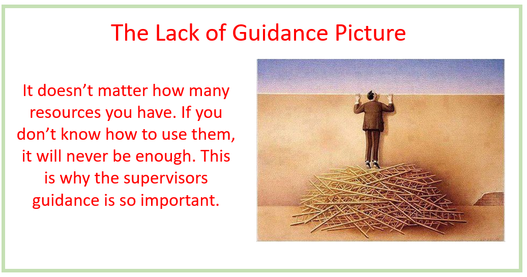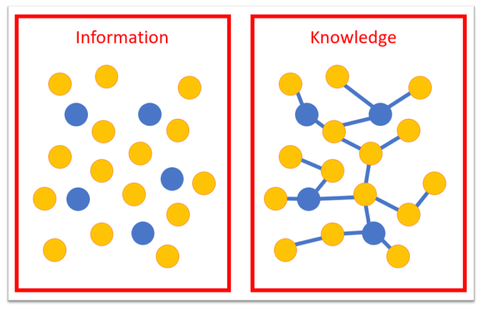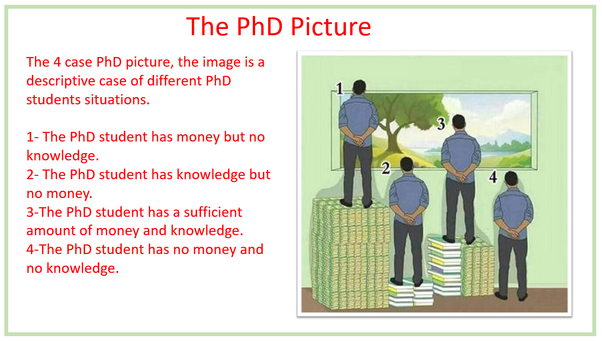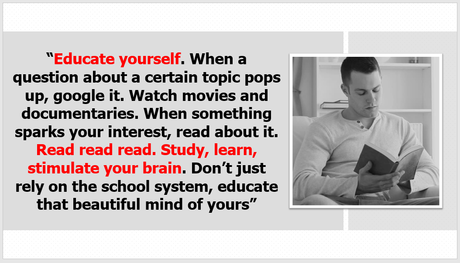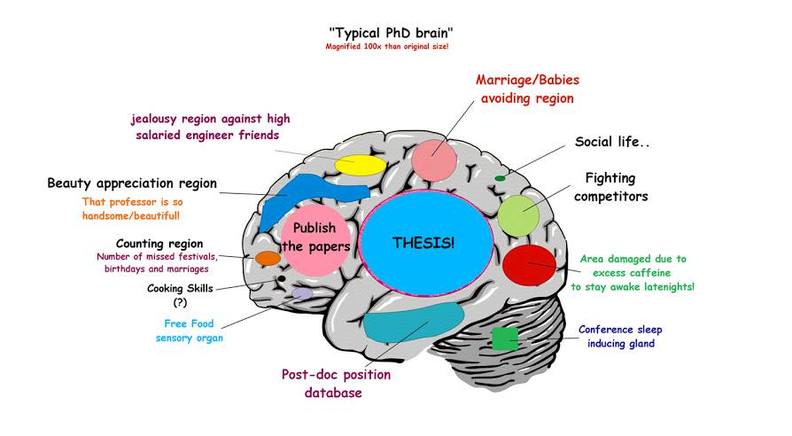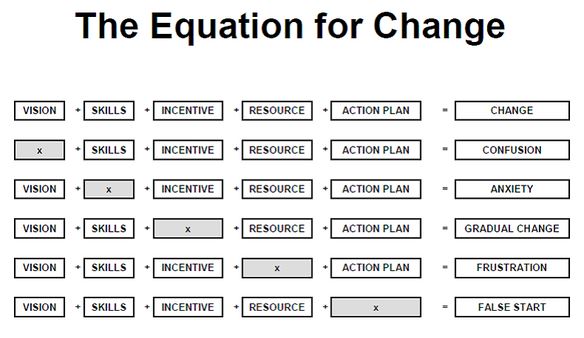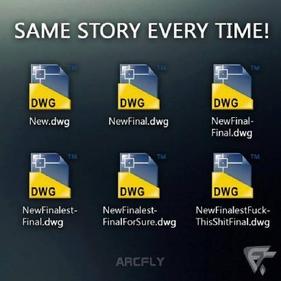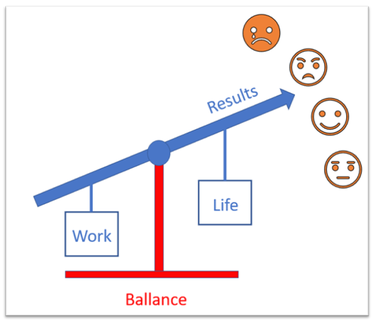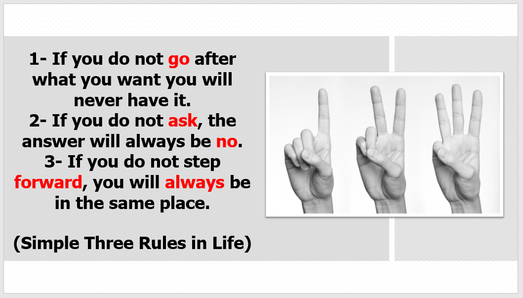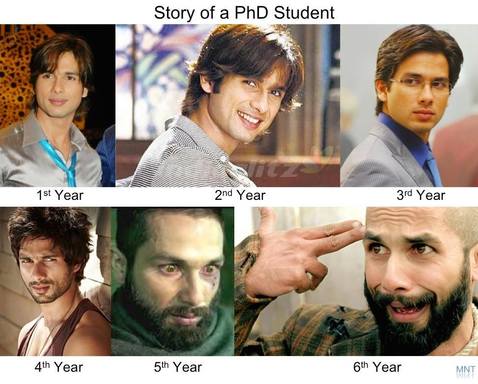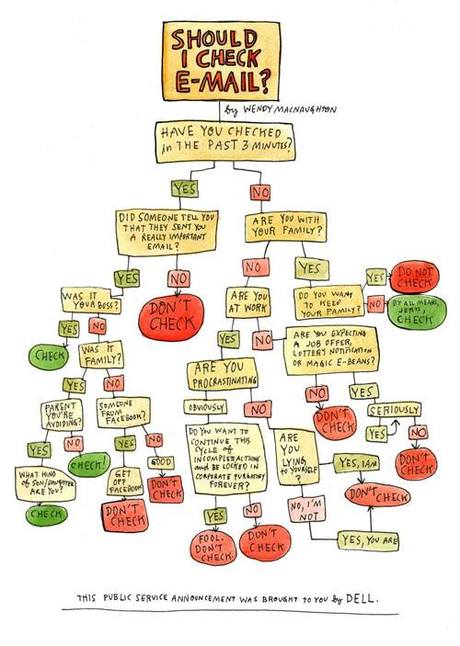PhD Experience and Advice
I would like to share my PhD experience with others to make life easier for them. Remember that the period of three years or four passes very quickly as much as you see its a long period as you will later find out that its not. Therefore I have found the following picture to be very expressible
If you find PhD is a long period of time another alternative attending you PhD on Mars:
A summary of all the stages a PhD student goes through
Supervisors Guidlines
During the process, the supervisor:
1- When asked, should provide feedback and guidance to students regarding their choice of research questions/project goals, data- or information-collection methods, and analysis strategies.
2- May hold individual work-in-progress interviews with students to discuss the progress of their papers or presentations, explore issues and/or discuss topics and perspectives, and question students as necessary.
3- May provide necessary background for a topic – including suggesting possible resources – so that students are not disadvantaged in their exploration.
4- May help students with the mechanics of the research process (e.g., strategizing to find answers to questions or helping them understand how to access resources).
5- May provide general feedback to students about elements of their papers or presentations that need improvement.
6- May vary in number, according to the needs of the paper or presentation.
During the process, the supervisor may not:
1- Generate research questions/project goals for students.
2- Conduct or provide research, articles, or evidence for students.
3- Write, revise, amend, or correct student work.
4- Provide or identify the exact questions a student will be asked prior to his or her oral defense (i.e., students should be prepared to answer every one of the oral defense questions).
5- Provide unsolicited help (i.e., students must initiate conversations that call for consultant feedback, such as asking a question to which the consultant can then respond).
1- When asked, should provide feedback and guidance to students regarding their choice of research questions/project goals, data- or information-collection methods, and analysis strategies.
2- May hold individual work-in-progress interviews with students to discuss the progress of their papers or presentations, explore issues and/or discuss topics and perspectives, and question students as necessary.
3- May provide necessary background for a topic – including suggesting possible resources – so that students are not disadvantaged in their exploration.
4- May help students with the mechanics of the research process (e.g., strategizing to find answers to questions or helping them understand how to access resources).
5- May provide general feedback to students about elements of their papers or presentations that need improvement.
6- May vary in number, according to the needs of the paper or presentation.
During the process, the supervisor may not:
1- Generate research questions/project goals for students.
2- Conduct or provide research, articles, or evidence for students.
3- Write, revise, amend, or correct student work.
4- Provide or identify the exact questions a student will be asked prior to his or her oral defense (i.e., students should be prepared to answer every one of the oral defense questions).
5- Provide unsolicited help (i.e., students must initiate conversations that call for consultant feedback, such as asking a question to which the consultant can then respond).
Sceintfic Contribution and Validation
The number one rule is that the scientific contribution is based on the recognition of members of research about your work. How is that achieved, the answer is through publications.
The second rule is always validate your work with experimental data done by you is recommended, because its much difficult to redo others work.
The third rule is persistence to achieve objective.
When PhD Becomes a Businesses More than an Educational System
This has been reported many times by students. A simple project can be made the worst nightmare for the student. Its when the academic institution tries to show students and others they are working on very complex and hard topics (pretending they are doing work). Then when people come to learn this science they find out its a big lie no one is willing to share or pass on their know how. In order to draw the student in a trap. Usually this happens after one year and a half that his selection was wrong and half of his PhD funds have already been used. This when the academic system becomes very much like any bureaucratic institution. The student is always diverted from his rights and not told about it so that he never finishes. Always the university keeps all the strong cards leaving the student with no strong cards to play and finish.
1- Never give the student constructive advice to get to the end goal.
2- Give him a project that has no end.
3- Never give him correct experimental data or arrange to give him wrong experimental data.
4- Drive him to an area of science that no one is willing to share or likes to work in.
5- Forcing the student to submit weak or incomplete work.
2- Give him a project that has no end.
3- Never give him correct experimental data or arrange to give him wrong experimental data.
4- Drive him to an area of science that no one is willing to share or likes to work in.
5- Forcing the student to submit weak or incomplete work.
How to know that your Work is New
You can check on Google and see the proposed project by your supervisor. Then you search for online publications and thesis relating to the subject. Once you found that some research is done in the required area the next step is to see what are the guidelines provided by the publishers to publish that kind of material in the good journal paper.
The best song that describes a PhD students experience is the Bee Gees Staying Alive song. when working with the wrong people:
What you know in a PhD can be characterized into three:
As a researcher your mind gradually adopts this study mode:
Researchers Guidelines: A General Overview
The researcher needs to accumulate a certain amount of information to be awarded the PhD, Circumstances and luck play a major role during the process. As a researcher you will have to get used of encountering problems on a regular basis. During the start of your PhD these problems will be regular but with time the student would accumulate the required skills to overcome these problems. The stress at the beginning of the process is a result of frustration of not knowing exactly how to approach the problem, so as a result the frustration is due to something assigned to the brain to handle which it has not dealt before. This is where the analysis of the problem comes in: is it a mathematical side of things, is it a hardware side of things, is it an external matter. The other thing is how much time do I have to give it, to what detail do i have to go to.
You need to keep trying thats how you get to your objective and achieve your goals. Do not ever expect to achieve your goals from the first trial.
PhD Advice:
The researchers input of experience and knowledge during the PhD process comes from the following:
1-Research Group:
Having a good group with colleges that are cooperative and willing to share knowledge is important. What has to be known is that the higher the teams standard, the better the prospectus and future of the group. What has to be clear to others is that you can’t know everything and what you now you will forget later if you don’t make use of it and pass on. If you feel that your group climate is uncooperative then that is a sign that you should change projects. Respect between people in a group is essential because once the respect has gone it is very difficult to get back. Once group members try to make you feel bad and incompetent then it’s not worth investing time in that group; if there is a good team leader he wouldn’t tolerate these actions. Another negative sign in the group is that the group leader focuses on one member. Once members in a research group feels one colleague is acting in a negative manner towards them then trust breaks down and sharing work and information becomes impossible.
If group members make it difficult to be accessible then that’s an indirect signal that they don’t want to help and through excuses they try to isolate you when they have their activities, lunch breaks, celebrations ....etc.
If group members make it difficult to be accessible then that’s an indirect signal that they don’t want to help and through excuses they try to isolate you when they have their activities, lunch breaks, celebrations ....etc.
2-Supervisor:
The supervisor has an overall view of the research field which helps you in knowing if the idea you are thinking of has or hasn’t been done before. Also, his attitude is to make the research group work in a team. When he makes his group works to publish that is a positive sign for progress. The supervisor should provide his student with space to work and think at the same time, not to cause him stress to the extent that the student has a breakdown. The student needs all his mind power to think and work, once the student starts having negative thoughts then he can’t work. You need to know your position, meaning that if your funding your PhD you have more freedom to take decisions regarding the direction of your work, while on the other hand your situation would be more restricting in the case of a funded project. A funded project by a company restricts you to the path specified by the funder therefore you end up working presenting, writing reports, preparing a poster and writing two to three papers during the PhD period.
You need not to rush in taking a decision on what field you want to work in, try to get a clear picture about the field you want to work in, this will help you in knowing the contents of your research proposal before enrolling into your PhD. Sometimes you need to be able to clarify that you can do the project you are assigned.
You need not to rush in taking a decision on what field you want to work in, try to get a clear picture about the field you want to work in, this will help you in knowing the contents of your research proposal before enrolling into your PhD. Sometimes you need to be able to clarify that you can do the project you are assigned.
Usually the student through PhD will acquire the information, shown on the left hand side, the problem with lots of ideas is linking them together, this is where your supervisors role comes guiding you to link the ideas together, as shown on the right hand side. When working with an effective responsible supervisor he will give you the circuit diagram to connect them while when working with a negligent supervisor he will will keep the circuit diagram to him self therefore that will increase the period of PhD from three years to 6-8 years.
The PhD student requires a sufficient work budget including his scientific knowledge accumulated throughout his education path line.
3-Books:
Usually at least one book in the research field has to be covered by the researcher relating to the research area, this book is sometimes regarded as the bible of the studied area. Sometimes if you have shifted to a new field completely you might have to read 60 books to fill all the fundamental gaps you need, that's a worst case scenario of course. But a medium level PhD would require you to read about 12 books.
4-Journals:
There is a certain amount of papers the researcher has to read as a requirement, the amount depends on how new or old the research field is. You would usually notice that at the end of the PhD thesis between 60 and 200 references have been mentioned. Again it’s not about the number, it’s about how efficiently you make use of the references to make a statement or back up a view for an argument.
5- Conferences:
Going to a conference after 6 months of the PhD would be helpful because that would provide you with a good summary on the latest developments on the field you are working on. Going to many conferences is a negative point because you won’t get the chance to work, plan and prepare and secure funding. If you see a conference as a holiday to get a sun tan or a vacation for shopping then find another job in life which provides you with such a life style. Research is time consuming and mentally demanding.
6-Visual Media Material such as YouTube:
There are lots of lectures on different scientific topics on YouTube, they can be helpful because you can watch them at any time you find convenient for you.
7-Friends:
During university life you mix with lots of people working in different areas of science. You can learn lots of skills from them just by listening to them on how they dealt with their problems and how they take notes. You have to learn how to communicate with different field of research scientists. This is a required skill especially as research teams are made up of several members, each with different skills and talents. There is no point in having a research group in which everybody has the same skills. Learn how to understand other cultures and respect them. Try to work with productive people. You need to have friends that understand your problem when you share it with them, not all people are capable of understanding your problem.
8-Web:
Lots of academics have their material online. That can really save you time through downloading their lecture notes, handouts and assignments. A PhD is a self learning process which requires a lot of reading. When looking at PowerPoint slides that are intended for lectures to assist students, you need to identify the slides that you can extract some fundamental issues from that you require to solve your problems. Sometimes the only way to solve your problem your stuck with is through contacting other people in the academic field, this is one of the blessings of the 21st century where internet provides you a window to the whole world. So when you do get stuck don't look at the walls.
9-Identfying Positive from Negative Guidance:
In around 6 to 8 months you can identify the quality of guidance you get if you have no prior knowledge in the field you have been chosen to work in. If you have prior knowledge you can figure out your situation at the first two months. The PhD time taken depends on many factors so do not compare yourself with others becouse each person is exposed to different challenges.
10- Problem Flow Up:
You will need to be persistent in following up your research data till you acquire all you need of data.
Ideas that can Improve Work Efficiency
During your PhD you will be exposed to lots of information you will need to find a way to cover it quickly and efficiently.
1-Having organized files on your desktop, I must admit it’s something difficult especially if you have started in a new field, at that time everything will seem important.
2-Organized publications and notes also books, I used to bind the publications in one set, print them one sided pages so that i can make notes on the blank side of the page.
Having Back Ups
Having a back up on your research data base is good, due to some unexpected circumstances that can occur such as laptop failure, viruses. As much as the idea seems straight forward and easy to do unfortunately most people don’t do it. And when they do encounter problems they start wishing they had done a back up. Sometimes you can make a quick back up of a file by emailing it to your email account, there are lots of other alternatives.
Try to have two external hard drives that you store your data on, try to always keep them at different places, due to the frequency of hearing that a hard drive of a friend has crashed and couldn’t retrieve his data that he worked on for several months or that his home was burgled and all hard drives where stolen.
Try to have two external hard drives that you store your data on, try to always keep them at different places, due to the frequency of hearing that a hard drive of a friend has crashed and couldn’t retrieve his data that he worked on for several months or that his home was burgled and all hard drives where stolen.
Hints for Developing Yourself
Making your web site helps you to be known in your field. Interacting with other researchers and exchanging ideas is also important. It also helps you to market yourself for a job. At the end of the day, all of us need money to live. With the quick development of internet and its tools it’s necessary for any researcher to know how to establish and maintain his website. Remember this is a onetime life opportunity therefore try to mix with other cultures and learn about them, don’t be too inward looking because you are paying money to come and develop as a character. This will help you develop and respect other nations.
Choosing your Working Environment
Having a shared office is beneficial if you have a positive working environment or if it’s a requirement from your supervisor to be in an office. While if you figure out that you have your needed skills and you have figured out it is a negative environment then having your own office is essential or the other alternative is either working from the library or working from home if your still single, if you can't then you need to make a medical excuse to leave the office so that the department provides you with a new space. There is no need to mention that you can't get along with your office colleagues its something natural not to get along with all people but sometimes by chance you end up with that the majority are not friendly. You need to quickly identify the source of negativity and filter it out to focus on your career objective. This paragraph shows you the importance of the working place, and draws your attention to how the work space will be comfortable to work in.
Dont Work on Weekends
Try to have weekends off.
How do I Know that I am Stressed and not Focused
This is something that the majority of people don't know that it's happening to them. Once you feel negative thoughts are taking over.
1-You will be always thinking about your problems and don't know how they will be solved, so in other words your life is a closed loop of thoughts, a problem that is usually solved in one minute you find that it will take you hours to do.
2-You focus on peoples actions an interpret them in a negative way, example you ask yourself why did he smile, why did he not say hi, usually these actions happen and you never give attention to.
3- Don't feel in the mood of eating, some people have the reverse where they eat more.
1-You will be always thinking about your problems and don't know how they will be solved, so in other words your life is a closed loop of thoughts, a problem that is usually solved in one minute you find that it will take you hours to do.
2-You focus on peoples actions an interpret them in a negative way, example you ask yourself why did he smile, why did he not say hi, usually these actions happen and you never give attention to.
3- Don't feel in the mood of eating, some people have the reverse where they eat more.
4-Sleeping pattern is messed up.
A word of advice dont get your self to the last stage
When you feel stuck write you problem on paper describing it in detail, then looking at what you have written try to number the problems, once this is done put them down in a list and then beside each one see what comes to your mind to solve. If you get stuck with some points then go to people that are specialized in area you are stuck in. If you can't find an answer to your problem on university campus then try to search on the net to an academic that is willing to help you.
Another helpful site is the following one: http://www.patient.co.uk/
The link to the depression section: http://www.patient.co.uk/doctor/depression
How stress affects your brain.
Writing Emails
Writing emails is the most important tool needed. Paper trail is important to prove your statement and project work plans. Emails can also be regarded as a reference to you, that will be more evident to you when you when hundreds of parameters are taken into consideration in your project.
A note: that there a certain protocols that have to be taken into account when sending emails to researchers.
This link might give the reader some hints:
http://erikap.tumblr.com/post/100853956/how-to-email-academic-staff-how-to-replyhttp://facweb.northseattle.edu/mleek/Teaching/Dev_Eng_97-98/Handouts_PPTS/Academic%20email%20how%20to.pdf
The following notes are very good for undergraduate students:
http://www.usm.edu/chemistry-biochemistry/e-mail-etiquette-adapted-academia
This link might give the reader some hints:
http://erikap.tumblr.com/post/100853956/how-to-email-academic-staff-how-to-replyhttp://facweb.northseattle.edu/mleek/Teaching/Dev_Eng_97-98/Handouts_PPTS/Academic%20email%20how%20to.pdf
The following notes are very good for undergraduate students:
http://www.usm.edu/chemistry-biochemistry/e-mail-etiquette-adapted-academia
Unless otherwise noted, all content on this site is @Copyright by Ahmed Al Makky 2012-2018 - http://cfd2012.com
